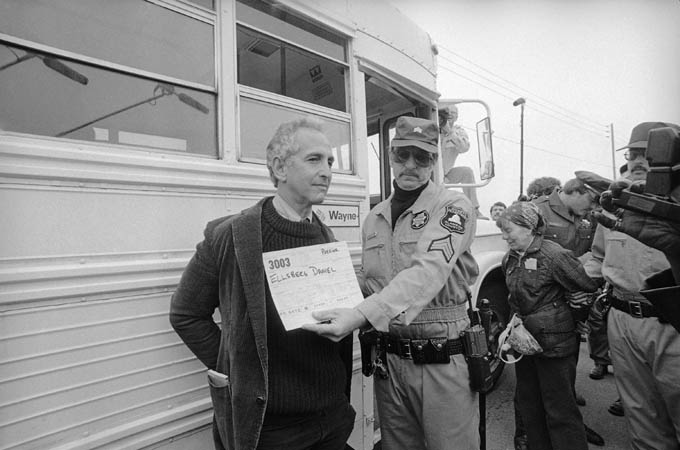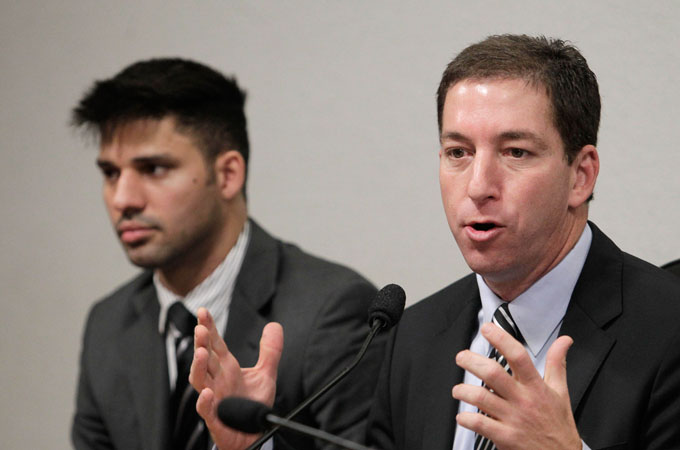Q&A: Daniel Ellsberg on US surveillance
The famed American whistle-blower discusses US national security, and those who expose its overreach.

Huntingdon, United States – In 1971, US military analyst Daniel Ellsberg leaked thousands of pages of a top-secret study on the Vietnam War to the American press. The Pentagon Papers, as the leak would come to be called, revealed previously shrouded layers of deception on the part of the US executive branch regarding decades of military involvement in Indochina.
The famed whistle-blower has since remained active politically, and is a vocal supporter of WikiLeaks and other government challengers such as Chelsea (formerly Bradley) Manning and Edward Snowden. US Army Private Manning leaked classified documents to WikiLeaks in 2010, and was convicted in 2013 of violating the Espionage Act.
Snowden, a former National Security Agency contractor, released classified documents to journalists Glenn Greenwald and Laura Poitras in 2013, and is currently residing in Russia.
Citing a wide array of historical and contemporary American intelligence programmes and policies, Ellsberg advocates critical consideration of the privacy needs of a free press and an active citizenry.
Nearing 83 years old, Ellsberg’s political energy shows no sign of atrophy. He spoke to Al Jazeera after giving a speech at Juniata College in Huntingdon, Pennsylvania.
| Daniel Ellsberg, Vietnam-era military analyst and whistle-blower |
Al Jazeera: For a lot of Americans it seems obvious that national security requires secrecy, but you have described some of the dangers of “secrecy culture”. Why is secrecy culture problematic?
Daniel Ellsberg: “Well I certainly don’t take the point of view that no secrecy is justified, or that national security never required secrecy. For example, in the Second World War, the time and place of the Normandy invasion was a very well kept secret, and moreover secured by lies as well as secrecy. It’s an interesting example, by the way – which people often bring up – because, of course, the necessary secrecy for that date and place expired rather rapidly in the course of June 1944. And yet, my guess is that there still are thousands of pages, perhaps more, tens or hundreds of thousands, that are still classified from that period. I could be wrong, by this time maybe it’s all been declassified; but it could have all been declassified certainly by 1946-47, and was not until many years later, if ever.
“Most of the documentation still called classified by this country, and I’m talking now about billions and billions of pages, most of that has long ago lost any justification for being held secret from the American people. The need is generally measured more in weeks, months, or a year or two, and yet it remains classified indefinitely. Why?
“Really, if you want to know the answer to that, my best guess as someone who worked inside the system, is that they never know what part of that may become embarrassing at some point in the future. What prediction will turn out to look absurd? Not merely wrong, but discreditable. What action may appear as part of the programme that all in all is unconstitutional, or illegal? What policy will appear to have been not only unsuccessful, but undertaken for unjustifiable, self-interested motives? It’s very hard to predict that, so simply keep it all secret, if possible, forever.”
AJ: Do you think it’s easier to overcome secrecy culture now, or harder, or any different than when you leaked the Pentagon Papers?
DE: “It’s much harder to challenge the culture of secrecy since 9/11. Just as it’s harder to challenge clearly criminal, illegal, internationally forbidden practices such as torture. It would be very hard to imagine a government official justifying torture before 9/11. However, once the American people were placed in some sense of danger, and realistically so, unfortunately it seems not to take a great deal of danger for the public to ratify throwing overboard many of our restraints on executive action. Ever since 9/11, both parties have claimed the need for greater secrecy than before.
“The current administration is probably the least transparent of any administration so far, according to many observers. That is despite President Obama having campaigned on having the most transparent government in history. It’s been just quite the opposite, but that was also true in George W Bush’s case, and for much the same reason.
“Many of the things that both administrations have been doing, in the way of assassinating people, both Americans and mainly non-Americans, overseas with drones and by special forces, is in very many cases arguably a war crime. Certainly the torture was indisputably a war crime.
“To keep that secret as long as possible was very much in the interest of the people pursuing those policies. When they were revealed, piecemeal, the public was led, I’m sorry to say, to accept the word of authorities that these things were necessary. This is while reports that looked at the practices of torture in detail have concluded that the torture was not only unnecessary, but actually had no useful effect at all. Yet a 6,000-page report on torture by the Senate Intelligence Committee is being kept secret on the command of the CIA, along with a report by the CIA itself, and there is no excuse for that at all. That report should be released, and if it’s not released, it should be leaked.
AJ: You discussed the difference between an ‘oath’ and ‘a secrecy agreement’, the tensions between the two for government employees, and how that might have played out for Edward Snowden. Could you comment on this distinction?
DE: “Well, I’ve said that, from my own experience and that of everyone in the government, we don’t take an oath of secrecy. We don’t raise our hands and say ‘so help me God’, we don’t make a solemn vow of any kind to keep secrets. We agree, and I did this too, to keep the secrets of the organisations – essentially, no matter what they reveal (though that isn’t spelled out for us) – as a condition of our employment. It’s essentially what people make in the private world all the time, called ‘non-disclosure agreements’. It has no more legal basis than in any corporation. There has never been a piece of legislation intended to frame or regulate the classification system – hardly anybody realises that. It’s an executive, administrative system.
“However, we all do – as members of Congress or any employee of the US government or any officer in the armed forces – take a real oath in every sense of the word. We swear (or affirm, for those whose religion forbids them to swear) under oath that we will defend and support – not the president or the secrecy system – we swear ‘to defend and support the constitution of the United States, against all enemies foreign and domestic’.
“People who are aware that governmental practices are criminal or deceptive, or aren’t constitutional, as I was aware during the run-up to the Vietnam War, and who don’t expose or resist those practices, violate that oath. Congress was being lied into a war in Vietnam, just as Congress, 40 years later, was lied into the Iraq war, and yet I kept silent about it, I did not inform the Congress, I did not inform the public. I was clearly violating my oath to the Constitution, without thinking about it, without paying any attention, just like all of my colleagues. No-one told the truth about what the president was doing, or the fact that we knew he was lying to the public. The same was true in 2002 and 2003, not one employee or one member of Congress obeyed their oath to the constitution to prevent Congress from being lied into that war.
 |
| Daniel Ellsberg arrested in June 1982 at the Lawrence Livermore Laboratory in California, as some 1,200 demonstrators opposed to nuclear weapons development were hauled off to jail [AP] |
“That is an oath that Edward Snowden upheld, that Chelsea Manning upheld, by protecting and defending the constitution, very specifically, the fourth Amendment in Snowden’s case, which guarantees the privacy from government of our private communications. That amendment has been virtually secretly repealed, with the collaboration of Congress and the courts, it has to be said.
“And yet, none of them can simply rescind and appeal an amendment of the constitution without following an amendment process. A court opinion doesn’t do it, an executive action doesn’t do it, and a law, whether it’s majority vote or unanimous, cannot simply repeal an amendment to the constitution. And yet that is what, in effect, has happened, unconstitutionally. Fortunately, the constitution is still there, can be read, it hasn’t been formally amended or suspended, although I do believe that in the hearts and minds of a lot of our officials they think that it was suspended after 9/11. It’s up to us to show them that they were wrong.”
AJ: What is the significance of prosecuting someone like Snowden versus not prosecuting someone like James Clapper, US director of national intelligence. Snowden leaked classified secrets, should Clapper be prosecuted for lying to congress about the extent to which the NSA was spying on Americans?
DE: “In terms of the law, there is probable cause here to indict him (Clapper) and to prosecute him for perjury. He took an oath – there’s another case where he raised his right hand and swore to God – that he would tell the truth, nothing but the truth. He failed to do that. He lied. That’s very clearly established. A prosecutor would not only be within her or his rights in bringing an indictment from a grand jury, but would seem to be virtually obliged to do so.
“In practical terms, though, the political environment does not oblige a prosecutor to do that. We can be sure that Clapper is not going to be prosecuted. Moreover, Congress could in theory actually send a marshall, arrest him, put him in the jail in the basement of the capitol and try him. The constitution allows for that. But the leaders of both parties and the committees in Congress, including the one that he lied to, the Senate Intelligence Committee, actually agree with the programme and believe it should have been protected from public controversy by secrecy. To maintain that secrecy they approve of his lie. So it’s a kind of complicity in law-breaking here, and in constitution-breaking, that shows us that our system of constitutional checks and balances is corrupted and broken, and is not working to preserve our democracy. That’s the challenge that Snowden has given us, by proving with documents that Clapper lied.”
 |
| American journalist Glenn Greenwald, right, has broken many stories on the NSA and paid a price for it [AP] |
AJ: A lot of these policies have been formed around the notion of ‘national security’. In your opinion, what is ‘national security’, and what do citizens need to take into consideration when they form opinions about national security policy? Has that changed at all since the Pentagon Papers?
DE: “That question is rarely asked, and it’s a good one to be asked.
“The fourth Amendment, by the way, uses the word ‘secure’. It aims at making citizens of the United States, and people residing in the United States “secure” in their persons and properties from unreasonable searches and seizures. So that part of national security applies to all of us, and of course is not just jeopardised but is actually demolished by the bulk surveillance that both NSA and FBI are conducting on us. I would say preserving our institutions, our constitution, our Bill of Rights, is at the core of our national security, and that is threatened by nothing so much as our own government, our own executive branch, and the complicity of Congress and judges lately in attacking the constitution and the Bill of Rights on which our freedom depends.
“Obviously, there are physical aspects to national security. The threat of invasion of this country is negligible and always has been, in contrast to continental countries. The threat, of course, of nuclear attack, let’s say by Russia, is an existential threat, as the Israelis like to say. That’s one example: we could be wiped out from one day to the next, from one hour to the next, by the weapons on alert in Russia right now, 30 years after the Cold War. And yet, are we doing what we could to eliminate those weapons by mutual agreement? Not at all. On the contrary we keep our own weapons on alert.
“Nothing so much threatens our actual existence, physical existence, other than our insistence on maintaining hundreds, 450 to be exact, Minuteman land-based missiles, which are operated so as to be launched on minutes of warning, justifying and virtually compelling the Russians to keep their hundreds of land-based missiles and to keep them on alert too, with both sides subject to false alarms.
 |
| The National Security Agency (NSA) allegedly collects some 200 million text messages and other personal data from mobile phones around the globe every day under a programme codenamed ‘Dishfire’ [EPA] |
“How about our security from climate change? Well we can’t, at this point, eliminate disastrous climate change, it’s gone too far. But we can do far more than we have to avoid the most catastrophic forms of it. We are not doing that, which is to say we are not securing our citizens in that way.
“Finally, there’s the very programmes which are described as addressing our security from terrorism, namely our drone attacks in Pakistan, that seem to be directly endangering us to terrorism. Drone attacks recruit terrorists in Pakistan, recruit far more than they kill, and more even than the civilians that they kill. For every one of those who’s killed, probably more than one human in Pakistan and Afghanistan are crossed over the edge into thinking about, and possibly joining, acts of terrorism against Americans.”
AJ: Given the technological capabilities of agencies like the NSA do you think any semblance of privacy can be saved? Can we rein in surveillance?
DE: “Well, it’s not obvious that we can. Is it really practically possible? I was told just today that there are a number of both technical and political measures that could be taken that will eliminate bulk surveillance, the mass surveillance of everyone. I’m talking not only about surveillance of and by Americans, but about surveillance of and by Germans, French, Egyptians, everybody in the world, really. The NSA is conducting mass surveillance, as are other countries on a smaller scale – only smaller because of their smaller budgets and capabilities. Before long, that difference won’t amount to much.
“So we have a global problem here, of surveillance, which makes it very easy to establish police states, and very hard to retain democracy, or to gain democracy. It’s very hard to have democracy when every element of your private life is known to the executive branch of your government – as the lives of East Germans were known to the Stasi, the East German Secret Police, in an era when the Stasi didn’t remotely have the surveillance capability that the US has now with the NSA and FBI.
 |
| Former NSA contractor Edward Snowden |
“It’s not that we are torturing people in America, or detaining them, or even calling them in for questioning, as the East Germans did. We don’t have a police state here yet. We do have the infrastructure for a police state, and over time in a gradual way I feel quite sure that will be abused. The question you ask, is there any way to avoid this? The answer I heard today from someone very well informed, was that no individual can be safe from surveillance by the NSA, and no group, exactly. But bulk surveillance, as is going on now, can be resisted and forbidden, and that’s very worth doing. This massive surveillance, which will soon be in the capability of every country on Earth, has to be addressed as a global threat to democracy. The US is not the only threat here.
“Nothing social is 100 percent inevitable. There is always an element of choice, of chance, and of movements that will shake things up unforeseeably, but some things are much more likely than others. When Obama asks whether this capability might be abused, I hear that like the statement, ‘water might run downhill’.”
AJ: Do you have any comments after your engagement with students and faculty at Juniata College?
DE: “I was very encouraged by the reaction from the students. I can even believe that Juniata will be a place that some actual initiative will come out of in terms of changing this. It would be wonderful if a student movement, activist movement, engages on this issue in a way that really has been very rare since the Vietnam War. The action against South African apartheid was very largely a student movement, with boycotts and what not, and ultimately quite effective. I would love to see students take up this constitutional challenge. After all, it’s their own physical lives that are ultimately at stake, and the kind of country they will live in for the rest of their lives.
“I think that in some ways they have foregone privacy so much, when it comes to Facebook and texting, and the internet in general, that they aren’t quick to perceive the difference it makes for the government to have all this information. The government can tax them, prosecute them, send them to war, which corporations can’t do by themselves. And so I think we’ve got to rethink, really, how much information we give to the internet, and to Google, and to Amazon, and to Facebook, in light of what we now know that they are giving it, or having it stolen from them, by the government.”